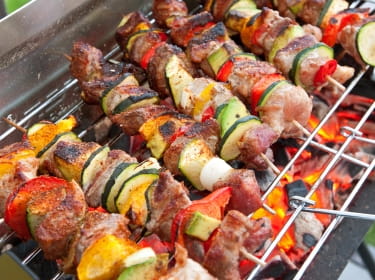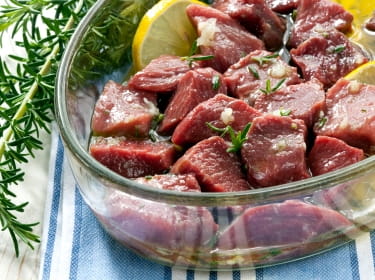Grilling Meat: Is It a Cancer Risk?

The Bottom Line
There is some evidence that people who eat a lot of charred or very well done meat have a higher risk of cancer, particularly of the breast, prostate, colon, rectum, and pancreas. To minimize the potential risks, minimize both the amount of time that meat is cooked at high heat and the amount of smoke in contact with the meat.

The Full Story
Could eating a lot of grilled meat cause cancer? The research says…maybe.
It is known that meats cooked at high temperatures, for example by frying or barbecuing, produce compounds called heterocyclic amines (HCAs). HCAs are associated with cancers in animals. There is some evidence that people who eat a lot of charred or very well done meat have a higher risk of cancer, particularly of the breast, prostate, colon, rectum, and pancreas.
It is also known that when fat drips down onto hot coals, the resulting smoke contains cancer-causing chemicals called polycyclic aromatic hydrocarbons (PAHs). The smoke can deposit PAHs onto the food being grilled. There is some evidence that people who work with PAHs have an increased risk of lung, skin, and bladder cancer.
Fortunately, there are simple steps that can minimize the potential risks of eating grilled meats while maintaining the smoky flavor that so many people enjoy. The keys are to minimize both the amount of time that meat is cooked at high heat and the amount of smoke in contact with the meat. In at least one study, marinating meat with commercial mixtures of herbs and spices reduced the amount of HCAs in the cooked steak.
Here are some tips:
- Use lean meat. Trim all visible fat.
- Consider marinating the meat with herbs and spices.
- Microwave meat until nearly done before putting it on the grill.
- Place meat on foil with some holes poked into it to minimize the amount of fat dripping onto the heat source.
- Don't eat charred portions of meat.
And remember: vegetables can be grilled, too. They do not generate HCAs or PAHs. They taste good when grilled and they are good for you!
Rose Ann Gould Soloway, RN, BSN, MSEd, DABAT emerita
Clinical Toxicologist
Prevention Tips
When grilling meat:
- Use lean meat.
- Trim all visible fat.
- Consider marinating the meat with herbs and spices.
- Microwave meat until nearly done before putting it on the grill.
- Place meat on foil with some holes poked into it to minimize the amount of fat dripping onto the heat source.
- Don't eat charred portions of meat.
For More Information
American Institute for Cancer Research: Guide to Healthy Grilling
National Cancer Institute Fact Sheet: Chemicals in Meat Cooked at High Temperatures and Cancer Risk
References
Cross AJ, Ferrucci LM, Risch A, Gruabard BI, Ward MH, Park Y, Hollenbeck AR, Schatzkin A, Sinha R. A large prospective study of meat consumption and colorectal cancer risk: an investigation of potential mechanisms underlying this association. Cancer Res. 2010;70:2406-14.
Hammond EC, Selikoff IJ, Lawther PL, Seidman H. 1976. of benzpyrene and cancer in man. Ann N Y Acad Sci. 1976;271:116-24.
Kabat GC, Cross AJ, Park Y, Schatzkin A, Hollenbeck AR, Rohan TE, Sinha R. Meat intake and meat preparation in relation to risk of postmenopausal breast cancer in the NIH-AARP diet and health study. Int J Cancer. 2009;124:2430-2335.Lee JE, Spiegelman D, Hunter DJ, Albanes D, Bernstein L, van den Brandt PA, Buring JE, et. al. Fat, protein, and meat consumption and renal cell cancer risk: a pooled analysis of 13 prospective studies. J Natl Cancer Inst. 2008;100:1695-1706.
Lloyd JW. Long-term mortality study of steelworkers: V. Respiratory cancer in coke plant workers. J Occup Med. 1971;13:53–68.
Mazumdar S, Redmond C, Sollecito W, Sussman N. An epidemiological study of exposure to coal tar pitch volatiles among coke oven workers. J Air Pollut Cont Assoc. 1975;25:382-9.
Nöthlings U, Yamamoto JF, Wilkens LR, Murphy SP, Park S-Y, Henderson BE, Kolonel LN, Le Marchand L. Meat and heterocyclic amine intake, smoking, NAR1 and NAT2 polymorphisms, and colorectal cancer risk in the multiethnic cohort study. Cancer Epidemiol Biomarkers Prev. 2009;18:2098-2106.Redmond CK, Ciocco A, Lloyd JW, Rush HW. Long-term mortality study of steelworkers: VI. Mortality from malignant neoplasms among coke oven workers. J Occup Med. 1972;14:62129.
Redmond CK, Strobino BR, Cypress RH. Cancer experience among coke byproduct workers. Ann N Y Acad Sci. 1976;271:102-15.
Rodriguez C, McCullough ML, Mondul AM, Jacobs EJ, Chao A, Paten AV, Thun MJ, Calle EE. Meat consumption among black and white men and risk of prostate cancer in the Cancer Prevention Study II Nutrition Cohort. Cancer Epidemiol Biomarkers Prev. 2006;15:211-6.
Rohrmann S, Zoller D, Hermann S, Linseisen J. Intake of heterocyclic aromatic amines from meat in the European Prospective Investigation into Cancer and Nutrition (EPIC)-Heidelberg cohort. British Journal of Nutrition. 2007;98:1112-1115.
Smith JS, Ameri F, Gadgil P. Effect of marinades on the formation of heterocyclic amines in grilled beef steaks. J Food Science. 2008;73:T100-T105.Stolzenbert-Solomon RZ, Cross AJ, Silverman DT, Schairer C, Thompson FE, Kipnis V, Subar AF, Hollenbeck A, Schatzkin A, Sinha R. Meat and meat-mutagen intake and pancreatic cancer risk in the NIH-AARP cohort. Cancer Epidemiol Biomarkers Prev. 2007;16:2664-2675.
Wu K, Sinha R, Holmes MD, Giovannucci E, Willett W, Cho E. Meat mutagens and breast cancer in postmenopausal women – a cohort analysis. Cancer Epidemiol Biomarkers Prev. 2010;19:1301-1310.
Zheng W, Lee S-A. Well-done meat intake, heterocyclic amine exposure, and cancer risk. Nutr Cancer. 2009;61:437-446.
Prevention Tips
When grilling meat:
- Use lean meat.
- Trim all visible fat.
- Consider marinating the meat with herbs and spices.
- Microwave meat until nearly done before putting it on the grill.
- Place meat on foil with some holes poked into it to minimize the amount of fat dripping onto the heat source.
- Don't eat charred portions of meat.
